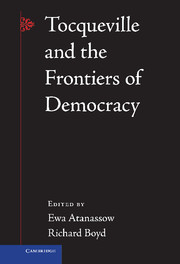Book contents
- Frontmatter
- Contents
- List of Contributors
- Short Title Abbreviations of Tocqueville's Major Works
- Acknowledgments
- Introduction: Tocqueville and the Frontiers of Democracy
- Part One The Meaning of Democracy and the Democratic Revolution
- Part Two Democratization in a Non-Western Context
- Part Three Challenges of Globalization: Democracy, Markets, and Nationhood
- Part Four Democracy, Imperialism, and Foreign Policy
- Part Five Democracy's Old and New Frontiers
- 13 Tocqueville, the Problem of Equality, and John Ford's Stagecoach
- 14 The Poetry of Democracy
- 15 Tocqueville and the Local Frontiers of Democracy
- Epilogue: New Frontiers, Old Dilemmas
- Bibliography of Works Cited
- Index
- References
13 - Tocqueville, the Problem of Equality, and John Ford's Stagecoach
Published online by Cambridge University Press: 05 April 2013
- Frontmatter
- Contents
- List of Contributors
- Short Title Abbreviations of Tocqueville's Major Works
- Acknowledgments
- Introduction: Tocqueville and the Frontiers of Democracy
- Part One The Meaning of Democracy and the Democratic Revolution
- Part Two Democratization in a Non-Western Context
- Part Three Challenges of Globalization: Democracy, Markets, and Nationhood
- Part Four Democracy, Imperialism, and Foreign Policy
- Part Five Democracy's Old and New Frontiers
- 13 Tocqueville, the Problem of Equality, and John Ford's Stagecoach
- 14 The Poetry of Democracy
- 15 Tocqueville and the Local Frontiers of Democracy
- Epilogue: New Frontiers, Old Dilemmas
- Bibliography of Works Cited
- Index
- References
Summary
I must begin with a disclaimer: as readers will no doubt realize, I do not quite belong with the Tocqueville experts in this volume. I do not write or, as we now must say, do research, on Tocqueville, and my main acquaintance with Democracy in America consists in teaching it nearly every year for the past 17 years in the Classics Core at the University of Chicago. However, Tocqueville shares a lot with a philosopher whom I do know something about – Hegel – and he raises issues that also concern a visual poet whom I also have some interest in – that great mythologizer of America's idea of itself, John Ford. So I entertain the hope that out of this mix of overlapping interests, I might have something to contribute to the discussion.
What Tocqueville and Hegel share, I want to say, is an approach to political matters. Neither of them directly asks the central question of classical political philosophy: What is the best human regime? Neither is indifferent to the question of the worthiness of some regime or other, but they do not propose to address that issue by wondering how best to approximate some ideal paradigm. Both, that is, do not separate the question of political philosophy itself from political actuality, where that especially means historical actuality. So let me start with a general remark about that issue and then discuss how that frames the way Tocqueville and Ford address the question of equality and its worthiness.
- Type
- Chapter
- Information
- Tocqueville and the Frontiers of Democracy , pp. 291 - 306Publisher: Cambridge University PressPrint publication year: 2013



